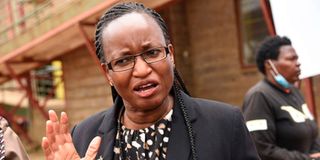Lobbies skip the launch of reproductive health policy

Health PS Susan Mochache.
The Health ministry yesterday distanced itself from claims it did not exercise public participation when formulating the Reproductive Health Policy, saying it reflects the opinion of a majority of Kenyans.
This came as civil society groups, who had been invited for the launch that happened in Nairobi yesterday, boycotted it, saying that its formulation was not inclusive.
Health Permanent Secretary Susan Mochache said the policy is long overdue and was developed through a lengthy consultative process in about five years, to ensure all Kenyans have a voice.
"Today's policy shift, if fully embraced, holds the tangible potential of bequeathing every Kenyan the enjoyment of the highest attainable standard of reproductive health provided by our progressive Constitution," said the PS
The policy seeks to address reproductive health issues for pregnant women and newborns, children, adolescents, early youth, adults and the elderly.
The expired 2007 policy has been reviewed to address alignment of reproductive health programmes with constitutional provisions such as devolution, need for crucial services by adolescents, and to address the urgent need to mainstream national reproductive health priorities like the Universal Health Coverage.
The policy is also expected to speak to struggling financing and to address the increased need for services by adolescents, the elderly and other groups.
Following the launch, civil society organisations (CSO) emphasised that their voice was illegally excluded from the policy.
Eight CSOs who boycotted said that the policy, by denying adolescents access to reproductive health services or information, fails to address teenage pregnancies. They also lamented that the policy fails to solve numerous cases of death due to unsafe abortion.
“It is the right of every Kenyan to participate in all decisions affecting their lives, including policy development,” said Mwikali Kivuvani, National Coordinator at the Sexual and Reproductive Health and Rights (SRHR) Alliance.
They also complained that the policy "sneaks in crisis pregnancy centres as a solution to unplanned and unintended pregnancies" and "leaves out large populations from accessing reproductive health by only making provisions for certain services for married couples alone."
But PS Mochache told journalists that issues such as abortion and the call to recognise members of the LGBTQ community go against the cultural belief of a majority of Kenyans.






